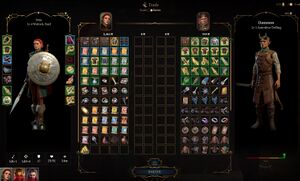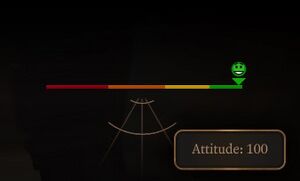Ad placeholder
Trading and item pricing
Trading is a central gameplay mechanic in Baldur's Gate 3 revolving around the sale and barter of Items and Gold. Depending on which Character is talking a given Trader, including the trader's Attitude to the character, the character's Persuasion skill level, and the Difficulty setting of the game, a trade price multiplier is calculated. This multiplier is than applied to each item's inherent value, giving the prices for the character.
The price modifier is calculated as:
- P = max(1.0, 2.5 - persuasion modifier - difficulty modifier - attitude modifier)
An item's value is multiplied by the price modifier when buying, and divided by the modifier when selling, i.e. the smaller the total price modifier the better for the player.
Modifiers
Persuasion skill modifier
A character's Persuasion skill modifier affects prices. Positive modifiers will make prices more favorable (higher when selling, lower when buying) and vice-versa. Each Persuasion modifier point changes the total modifier by 0.1. In Explorer difficulty, characters receive an additional Persuasion modifier if they are proficient in Persuasion, as detailed below.
- Persuasion modifier = Persuasion skill modifier * 0.1
Game difficulty
Depending on the game difficulty set, the player receives certain advantages or disadvantages.
Explorer difficulty
In Explorer difficulty, the difficulty modifier is 0.5. If a character is proficient in Persuasion, they receive an additional Proficiency modifier depending on their level. This increases the Persuasion modifier.
| Level | Bonus |
|---|---|
| 1 - 4 | +2 |
| 5 - 8 | +3 |
| 9 - 12 | +4 |
Tactician difficulty
In Tactician difficulty, the difficulty modifier is -0.5, meaning the total modifier is increased, making it more expensive to buy and lowering the sell price.
Trader attitude
A trader's Attitude score represents how friendly a trader NPC is with a certain character. Each point of Attitude changes the total modifier by 0.005, resulting in a maximum attitude modifier of 0.5 at 100 Attitude.
- Attitude modifier = Attitude * 0.005
Attitude is visible in the Trading interface under the trader model. Hovering on the meter displays the exact Attitude score. Attitude is per-character, and can be modified by friendly or hostile actions against an NPC. One of easiest ways to gain Attitude is by gifting Gold or other items to a trader using the Barter interface. The amount of gold required to gain attitude scales depending on the level of the player character.
| Level | Gold required to raise Attitude by 1 | Gold required to raise Attitude from 0 to 100 |
|---|---|---|
| 1 | 4 | 400 |
| 2 | 5 | 500 |
| 3 | 6 | 600 |
| 4 | 8 | 800 |
| 5 | 10 | 1000 |
| 6 | 14 | 1400 |
| 7 | 18 | 1800 |
| 8 | 24 | 2400 |
| 9 | 30 | 3000 |
| 10 | 36 | 3600 |
| 11 | 45 | 4500 |
| 12 | 45 | 4500 |
Talking character
The trade price modifier is set depending on the character that initiates the dialogue with a trader. Even if the active inventory is switched in the trader screen, the first character's trade price modifier remains in use. It is thus a good idea to initiate all trade dialogues with the character that has the best trade multiplier.
See also
References
- GaRy van Thos Gaming, "How Merchant and Traders Attitude work and effect Prices in Baldur's Gate 3". youtube.com
- Annie Shi, "Baldur’s Gate 3: How To Raise Merchant Attitude". thegamer.com

